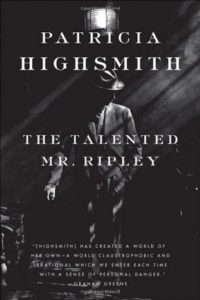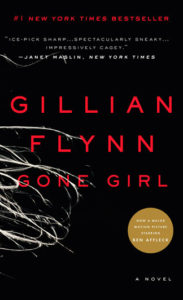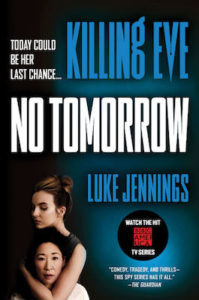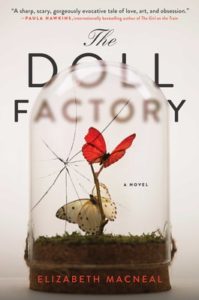Monster. Evil. Demon. It makes us feel safe to categorize villains in this way. It fits with our view of the world; they are obviously monstrous and we have nothing in common with them. What’s more, they will be discovered and punished and we will rejoice when this happens.
But what happens when those who commit crimes are humanized? All of a sudden, we lose this sense of certainty, of safety in the world. They could be anyone. They could be our next door neighbor, or even worse, ourselves, when pushed to the limit. This realization not only has the capacity to make the antagonist more terrifying because they are possible and relatable, but can also throw our own morals into disarray. Because sometimes, we end up feeling not only sympathy for those who commit the darkest and most deplorable acts, but actually rooting for them. Our sense of justice, of order, begins to falter. It is an unsettling position as a reader, and a masterful feat by an author.
In my novel The Doll Factory, I wanted to explore what made my antagonist, Silas Reed, the psychopath he becomes. I wanted, even, for the reader to feel sympathetic towards him, and for this to unsettle them much more than simple disgust or loathing would have done. And as part of my research, I read many books—but especially those with villains who we pitied, or maybe even rooted for.

Tom Ripley from The Talented Mr. Ripley by Patricia Highsmith
I don’t think I’ve ever rooted for a character more than I’ve rooted for Tom Ripley. I yearned for him to get away with his crimes, and even felt relief when the tension of a situation was resolved by him committing murder. This did not make me feel good about myself. In fact, I finished the book utterly appalled at what I would forgive and even cheer on in his behavior, but also deeply impressed by Patricia Highsmith’s skill in constructing such a character.
How did she do it? Tom Ripley is the classic underdog—the character with whom everyone can empathize. Tasked with traveling to Italy to bring the privileged and extravagant Dickie Greenleaf home, we quickly learn that Tom has a difficult background and craves acceptance—to the extent he is willing to impersonate others to fit in. But it is not only this endearing awkwardness, but also his cleverness and his hardworking nature that makes him so likable, and makes us want him to succeed at any cost. What’s more, Highsmith only gives us his perspective—we understand his problems, his desires and his emotions, while the characters around him always feel at one remove, filtered through Tom’s eyes. I smarted at their dismissive treatment of him, and ultimately their deaths didn’t feel like a loss at all. It’s only fiction, I told myself when I was reading the book, though I felt uneasy, as if I’d been complicit in his crimes.

Amy Dunne from Gone Girl by Gillian Flynn
On the morning of Nick and Amy Dunne’s wedding anniversary, Amy goes missing. What follows is a he said / she said account of what led to her disappearance, with Nick looking increasingly guilty. But things are not as they seem, and a fantastic twist reveals Amy Dunne as a psychopath—I actually gasped when I read it.
But rather than loathing Amy, I found myself not only impressed by her, but actively rooting for her. Part of this, I think was because of her relatability—her rant on “the cool girl” myth, and her fight against perfection, after always feeling the need to conform to the stories of “Amazing Amy.” What’s more, Flynn’s decision to place her in jeopardy around Jeff and Shawna, and later Desi, left me wanting her to escape, to survive. And behind it, her husband Nick might be redeemable, but he is also ineffectual, unfaithful and scarcely knows her—didn’t he deserve some sort of punishment, I wondered? There was something so escapist in her unapologetic quest for revenge—hers is a turbo-charged account of the bold, outrageous lengths we could go to if wronged, but know we never will.

Frederick Clegg from The Collector by John Fowles
Frederick Clegg still gives me nightmares. I can picture him perfectly—a wispy voice, a cringing manner, buttoned cardigans. If you met him, he would radiate desperation, hopelessness, an entire lack of threat. But this masks a deluded mind, a desire to possess, a disconnect between reality and fantasy. Frederick is a butterfly collector, an outcast of society, and he forms a plan to kidnap an art student called Miranda and hold her captive in his cellar.
While John Fowles could have made Frederick monstrous, it is the touches of humanity that make Clegg more chilling. In fact, he is most terrifying at the points where he is most pitiful. I hated him even more because I could imagine him so fully. He is lonely, deluded and just wants to be loved. Two years after finishing The Collector, I still think about Frederick more than I would like.

Villanelle from Killing Eve: Codename Villanelle by Luke Jennings
Perhaps it is wrong to say I felt much sympathy for Villanelle. But the reality is worse: while wincing at times, I also reveled in her crimes, was captivated by her remorselessness, and I actively wanted her to get away with it. Villanelle is an assassin, and MI5 agent Eve Polastri is tasked with hunting her down. But as the two women battle it out, they become obsessed with one another.
We have two sides—Eve versus Villanelle, justice versus anarchy—and it’s no mean feat that Luke Jennings made me root for both figures. He succeeds in this partly because Villanelle is so enchanting; she is constantly surprising and overturns so many tropes associated both with women and with female assassins. Her coldness is intriguing, she is blackly witty, revels in power, and she isn’t afraid to be vulnerable—even if that is immediately undercut. Her rebelliousness is joyful and somehow liberating. What’s more, Eve’s obsession with Villanelle (and her reluctant refusal to condemn her) legitimized my own feelings towards Villanelle. I was so drawn to her that I began to share, and even celebrate, her remorseless view of the world.

Barbara Covett from What Was She Thinking? Notes on a Scandal by Zoe Heller
As with The Talented Mr Ripley, Zoe Heller chooses to limit us to one perspective, that of the sociopath Barbara Covett. Barbara, like Tom Ripley and Frederick Clegg, is an outcast, and evokes our sympathy with her loneliness. She is a schoolteacher, but her life changes when Sheba Hart joins the school as an art teacher and befriends her. Sheba, however, begins an affair with an underage student, and this is when Barbara’s interest in her friend begins to take a darker turn.
Part of the sympathy I felt for Barbara derives not only from her status as a lonely underdog, but also because her account takes the form of a diary. We are privy to every desire in her life, every pain, and we feel every betrayal alongside her. Given hers is the only account we have, it feels inevitable that we will side with her, that we will even become complicit in her crimes. And what’s more, as Barbara’s obsession deepens, she grows more powerful and impressive—and evokes our admiration rather than just our pity.
* * *


















